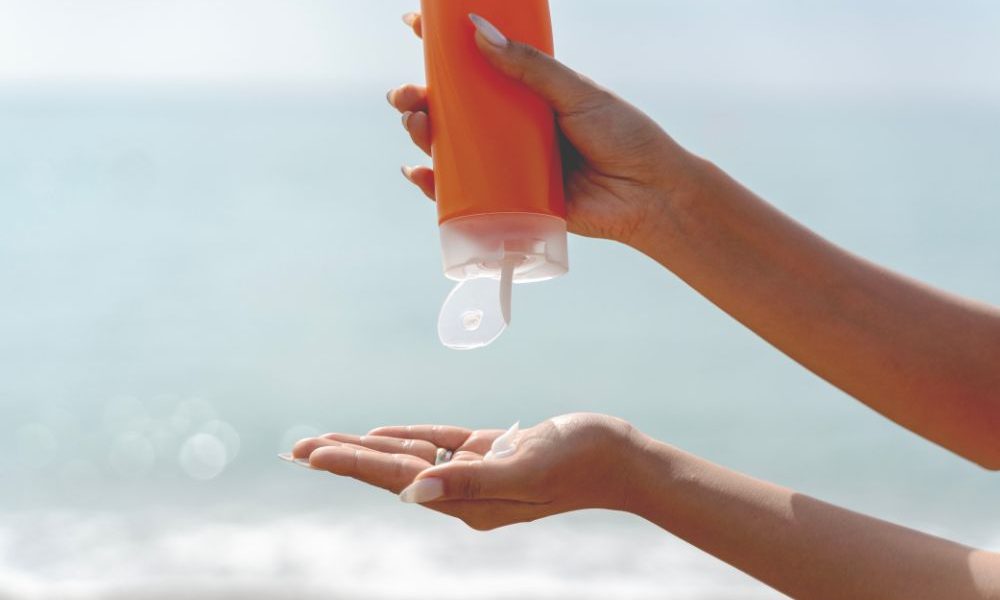Sunscreen is an essential part of any skincare routine, regardless of your age or skin type. It acts as a barrier against the harmful effects of ultraviolet (UV) radiation from the sun, which can cause premature aging, skin cancer, and other skin damage. This guide will help you understand the importance of sunscreen, how to choose the right one, and how to use it effectively.
Why Sunscreen is Crucial
Using sunscreen daily is the most effective way to protect your skin from the sun’s harmful rays. UV radiation is present year-round, not just during the summer. Even on cloudy days, up to 80% of UV rays can penetrate your skin. This constant exposure can lead to cumulative skin damage over time.
Dr. Jeanine Downie, a board-certified dermatologist, emphasizes that sunscreen is the most important skincare product you can use, regardless of your age or skin type. This highlights the universal necessity of sunscreen in maintaining skin health and preventing serious conditions like melanoma.
Understanding SPF and Broad-Spectrum Protection
When selecting a sunscreen, it’s crucial to understand what SPF (Sun Protection Factor) means. SPF indicates how well the sunscreen can protect your skin from UVB rays, the type of radiation that causes sunburn and contributes to skin cancer.
However, Dr. Whitney Bowe advises that SPF alone is not enough. It’s essential to choose sunscreens with broad-spectrum protection, which means they block both UVA and UVB rays. UVA rays penetrate the skin more deeply and are primarily responsible for premature aging and long-term skin damage.
Choosing the Right Sunscreen
Selecting the right sunscreen involves considering several factors, including your skin type, activity level, and personal preferences. Here are some tips to help you make the best choice:
Skin Type
For oily or acne-prone skin, look for oil-free, non-comedogenic formulas that won’t clog pores. If you have dry skin, opt for moisturizing sunscreens with ingredients like hyaluronic acid or glycerin.
Activity Level
If you’re active or spend a lot of time outdoors, choose water-resistant sunscreens that stay effective even when you sweat or swim. Remember that these need to be reapplied more frequently.
Formulation Preferences
Sunscreens come in various forms, including lotions, creams, gels, sprays, and sticks. Choose one that you find easy and comfortable to apply.
How to Apply Sunscreen Correctly
Proper application is key to ensuring your sunscreen works effectively. Here’s a step-by-step guide:
Apply Generously
Use enough sunscreen to cover all exposed skin. Most adults need about one ounce (a shot glass full) to cover their entire body.
Apply Early
Apply sunscreen at least 15 minutes before going outside to give it time to absorb into your skin.
Reapply Frequently
Dr. David Bank recommends reapplying sunscreen every two hours, even when you’re not swimming or sweating. This ensures continuous protection throughout the day.
Cover All Areas
Don’t forget easily overlooked areas like your ears, neck, and the tops of your feet. For lip protection, use a lip balm with SPF.
Everyday Sun Protection Tips
In addition to using sunscreen, incorporating other sun-protection measures into your daily routine can enhance your skin’s defense against UV damage:
Wear Protective Clothing
Long-sleeved shirts, wide-brimmed hats, and sunglasses can provide additional protection.
Seek Shade
Whenever possible, stay in the shade, especially between 10 a.m. and 4 p.m. when the sun’s rays are strongest.
Be Mindful of Reflections
Surfaces like water, sand, and snow can reflect and intensify UV rays, increasing your exposure.
Choosing Sunscreen for Different Seasons
The type of sunscreen you need can vary depending on the season and your activities. Here’s how to choose the best sunscreen for each season:
Spring and Summer
Opt for lightweight, water-resistant formulas with high SPF for outdoor activities.
Fall and Winter
Moisturizing sunscreens with hydrating ingredients are ideal for colder months when skin tends to be drier.
Special Considerations for Children and Sensitive Skin
Children and individuals with sensitive skin require special attention when it comes to sun protection. For kids, choose sunscreens specifically formulated for their delicate skin, which are usually fragrance-free and hypoallergenic. Mineral sunscreens containing zinc oxide or titanium dioxide are often recommended for sensitive skin as they are less likely to cause irritation.
Addressing Common Sunscreen Myths
There are several misconceptions about sunscreen that can lead to improper use or avoidance. Let’s debunk some common myths:
Myth: Sunscreen is only necessary on sunny days.
Fact: UV rays can penetrate clouds and cause skin damage even on overcast days.
Myth: Higher SPF sunscreens don’t need to be reapplied as often.
Fact: Regardless of SPF, all sunscreens need to be reapplied every two hours for continuous protection.
Myth: People with darker skin don’t need sunscreen.
Fact: While darker skin has more natural protection against UV rays, it is still susceptible to damage and skin cancer. Everyone, regardless of skin tone, should use sunscreen.
Personal Experience with Sunscreen
Incorporating sunscreen into your daily routine may seem like a hassle at first, but it becomes second nature over time. I remember when I first started using sunscreen daily, it felt like an extra step I didn’t have time for. However, after a few weeks, I noticed my skin felt more hydrated and looked healthier overall. Now, I can’t imagine going a day without it.
The Science Behind Sunscreen
Scientific studies support the effectiveness of sunscreen in preventing skin damage and maintaining overall skin health. A study published in JAMA Dermatology found that higher SPF sunscreen use was associated with a significantly reduced risk of melanoma, the most serious form of skin cancer. Additionally, research published in the Journal of the American Academy of Dermatology concluded that sunscreen use is an effective way to prevent photoaging, which is the premature aging of the skin caused by sun exposure.
Final Thoughts
Sunscreen is a vital component of a comprehensive skincare routine. It protects your skin from harmful UV radiation, reduces the risk of skin cancer, and prevents premature aging. By choosing the right sunscreen for your skin type and using it correctly, you can enjoy the sun safely and maintain healthy, youthful skin year-round.
Embrace the habit of daily sunscreen application and make it an integral part of your skincare regimen. Your skin will thank you for it in the long run.




